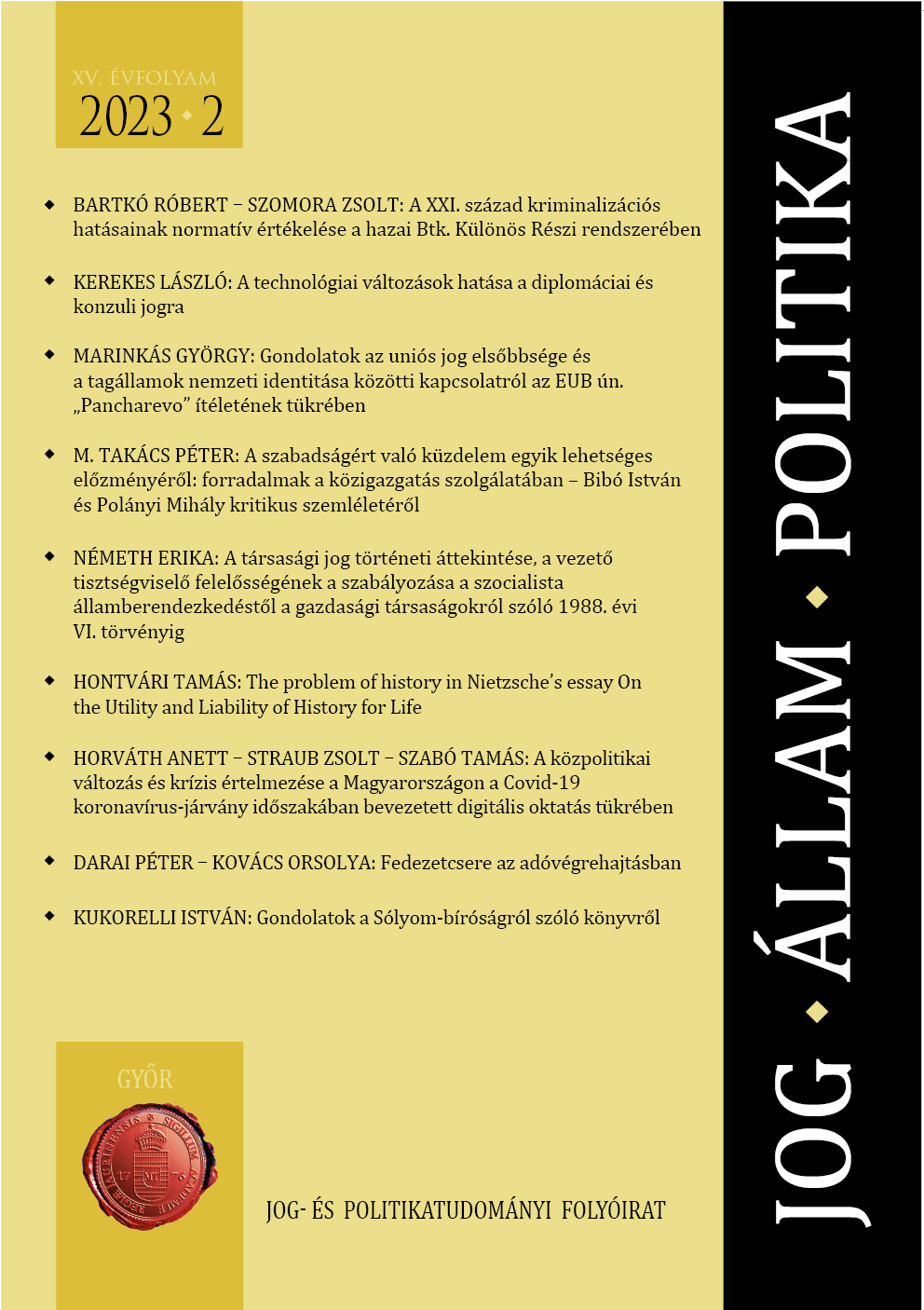Gondolatok az uniós jog elsőbbsége és a tagállamok nemzeti identitása közötti kapcsolatról
ABSTRACT
The issue of the rights of same-sex couples to get married and to adopt can be seen as a topical issue in everyday life and in politics. It is also an issue that is constantly being addressed in practice by national supreme/constitutional such as the European Court of Human Rights and the Court of Justice of the European Union as well. This paper analyses the relevant jurisprudence of the above-mentioned two judicial fora in the light of the CJEU’s so-called ‘Pancharevo-judgment’ delivered in December 2021. In the said case, the Court of Justice had to decide whether the unconditional prevalence of the right of free movement of persons under the Founding Treaties, over the traditional concept of the family in a given country, would be contrary to the national identity of the Member State. These issues are of particular importance because, if the Member State is ultimately forced to functionally yield to the primacy of EU law in a multitude of areas, the question arises as to whether the Member State will have any room for manoeuvre left despite the fact that its Constitution remains otherwise unchanged? Although the Court has stressed the margin of manoeuvre that Member States have in this area, it has ruled that EU law must prevail. The conflict between the primacy of EU law and the national identities of the Member States is seen to be resolved by the so-called functional approach principle, which will be explained in detail in this paper.
KEYWORDS
* same-sex marriage * adoption * primacy of EU law * functional recognition * principle of effectiveness * national identity *
IRODALOM
Benyusz Márta – Marinkás György (2022): Az örökbefogadásra vonatkozó nemzetközi szabályok és az uniós jogi háttér. In: Visontai-Szabó Katalin – Benyusz Márta (szerk.): A gyermek érdekének biztosítása az örökbefogadás során. Mádl Ferenc Összehasonlító Jogi Intézet, Budapest. DOI: https://doi.org/10.47079/2023.bmvszk.gyermek.8_2.
Benyusz Márta (2021): A gyermekek jövője az Európai Unióban – Mit ígér a Bizottság 2021-2024-es stratégiája? In: Jog–Állam–Politika. 2021/3. sz.
de Groot, David (2021): EU Law and the Mutual Recognition of Parenthood between Member States: the Case of V.M.A. v. Stolichna obshtina.’ In: European University Institute. (Elérhető: https://cadmus.eui.eu/handle/1814/69731. Letöltés ideje: 2023. május 4.).
Gellérné Lukács Éva (2020): Az egyenlő bánásmód, a nem diszkriminatív akadályok és az intézményesített jogvédelem fejlődése a személyek szabad mozgása területén. In: Állam- és jogtudomány. 61 (3).
Grünberger, Michael (2010): Die Gleichbehandlung von Ehe und eingetragener Lebenspartnerschaft im Zusammenspiel von Unionsrecht und nationalem Verfassungsrecht. In: Familie Partnerschaft Recht. 16 (5).
Marinkás György (2021): Ultra Vires avagy sem? Az EKB által alkalmazott válságkezelési eszközök és azok konformitása az uniós joggal, különös tekintettel az EUB és a Német Szövetségi Alkotmánybíróság közötti évtizedes hatásköri vitára. In: Miskolci Jogi Szemle. 16 (5). DOI: https://doi.org/10.32980/mjsz.2021.5.1476.
Pfeiff, Silvia (2017): La portabilité du statut personnel dans l’espace européen. Bruylant Publishing, Bruxelles.
Schmidt, Vivien (2016): Reinterpreting the rules ‘by stealth’ in times of crisis: a discursive institutionalist analysis of the European Central Bank and the European Commission. In: West European Politics. 39 (5). DOI: https://doi.org/10.1080/01402382.2016.1186389.
Trócsányi László – Sulyok Márton (2020): Felvetések és feltevések hatáskörről, szerepfelfogásról és egyensúlyról az Európai Unió „intézményi háromszöge” kapcsán. In: Bodnár Eszter – Pozsár-Szentmiklósy Zoltán – Somody Bernadette (szerk.): Tisztelgés a 70 éves Dezső Márta előtt. Gondolat Kiadó, Budapest.

